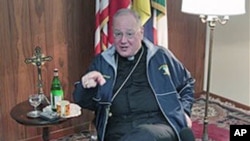A group of university students throws around a frisbee, taking advantage of a sunny spell during a break between classes. The scene could be at almost any college in the United States.
But it is at the Catholic University of America and it masks a lively debate on this campus about the line between church and state, especially when it pertains to women and birth control.
Under President Barack Obama's health insurance reform, students and faculty covered by the insurance plans of Catholic universities like this one will be reimbursed for contraceptives. But the so-called "contraceptive mandate" has come up against stiff opposition from the Roman Catholic Church and many of its adherents in the United States.
"This is not an issue of whether birth control should be used," says Regina Conley, who works at the student newspaper. "I think it's an issue of a Catholic university has certain principles and certain standards, and people should expect that."
"It's a woman's right," counters Bridget MacDonald. She says that health for many women depends on access to contraceptives.
"If they're not able to access such important things then it just isn't right. The employer should not be able to determine that no matter what your religion, creed, anything like that."
Although this is a Catholic-run university, many of the students are non-Catholics.
President Obama's health care reform requires employers in the United States to provide contraceptive coverage for their employees. Churches and other dedicated houses of worship with moral objections can get an exemption, but not lay institutions such as religious-run hospitals, charities and universities, which serve the wider public and hire workers from outside the faith.
Maria Sophia Aguirre teaches economics at Catholic University. A vociferous opponent of contraception, she said government agencies have no right to promote it as an aid to women's health.
"This, as a woman, I find insulting," she said. "I am not a tool of policy and I don't need the government to tell me how should I use my sexual activity."
Aguirre said anyone who wants contraceptive coverage should find another university.
Most Catholics in America disagree with her. A CBS / New York Times poll earlier this month found that a majority believe that religiously affiliated employers should offer health insurance that provides contraception.
But last November, their bishops launched a campaign against the mandate - and many wrote protest letters that parish priests later read at church services.
John Allen, Jr., is the Vatican correspondent for the National Catholic Reporter and author of several books on the church. He said that in the back of the bishops' minds is the fact that more than 50 percent of Catholics who voted in 2008 chose President Obama.
“I think the bishops in some way perceive Obama as a rival for leadership in the American Catholic community," he said.
But Stephen Shneck, who teaches political science at Catholic University, said the bishops prepared well for this battle.
"They had a committee in place. They had the money in place. They had a message ready to go and so they very quickly mobilized," he said. "And yes, I think they're feeling their oats right at the moment. They've had tremendous political success with this."
Under pressure from not only the bishops, but also conservative Protestants and Republican lawmakers, Obama has modified the plan so that religious employers don't have to pay for contraceptives directly. Instead, the insurance companies will pay the reimbursement. But the bishops say that is still unacceptable and are redoubling their campaign against what they say is a violation of their religious liberty.










